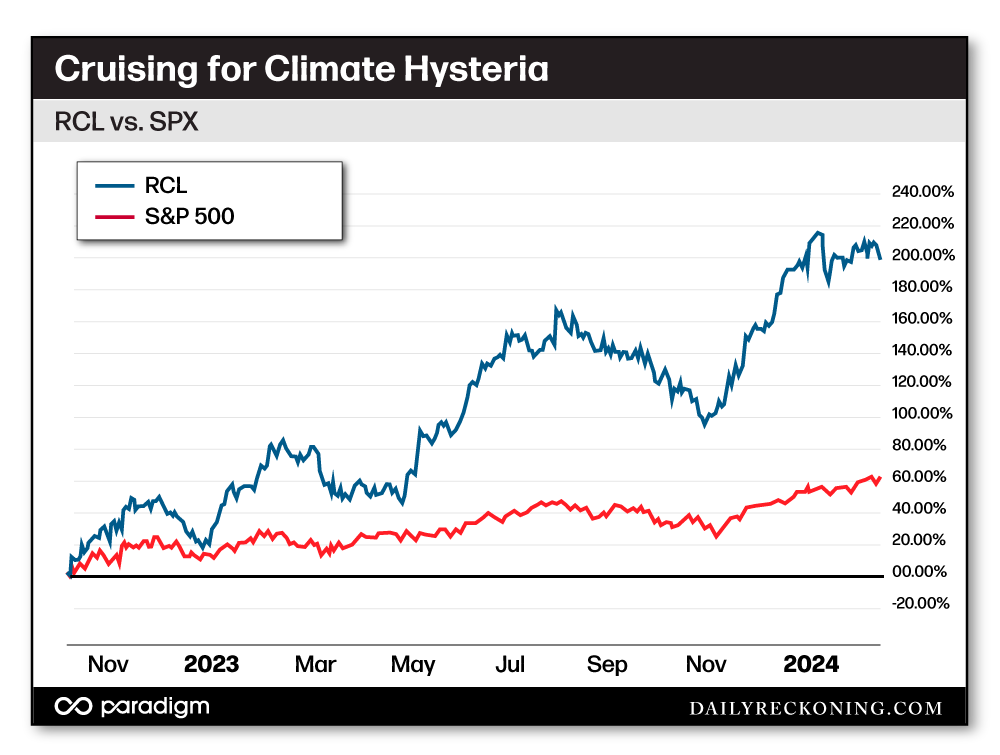Laughing Down the Road to Climate Change Hell
I didn’t find out about my county’s new plastic bag ban until I was left standing dumbfounded with an arm full of groceries at a crowded (and bagless) self checkout station.
An annoyed clerk finally walked by and handed me a paper bag, charged me five cents, and sent me on my way.
Thanks to the bag ban, I have a new grocery store routine. Every last-minute trip to pick up bread, milk, and bananas now involves me forgetting to return my reusable bags back in my car. I won’t remember this detail until I’m halfway through my shopping, leaving me digging into the pile of brown paper bags at checkout, paying a few extra cents, and swearing I’ll remember those pesky bags on the next trip.
For the record, I don’t mind paying an extra dime every time I go to the store. A bag of chips that used to cost a buck goes for $4.99 these days, so a couple of brown paper bags aren’t going to bust my grocery budget.
But I did have the distinct feeling that the plastic bag ban wasn’t actually saving anything – not the planet, not sea turtles, and certainly not me. And I didn’t have to dig very deep to confirm my suspicions.
A quick search led me to a report from the Freedonia Group examining the effects of a similar single-use plastic bag ban enacted in New Jersey in 2022. The report cites that the ban worked as intended, curbing the use of plastic grocery bags 60% statewide.
Of course, this doesn’t tell the full story.
The issue is consumers instead started using those thick, reusable polypropylene bags. And – you guessed it – these bags require a lot more plastic (and energy) to make and aren’t even recyclable.
Even worse, the report finds most of these reusable bags are only used two to three times on average before they end up in a landfill or lost somewhere in your house. I can relate. My family owns a polypropylene bag that we’ve stuffed with at least two dozen other reusable bags we’ve accumulated over the years. It sits in a closet, and occasionally gets rifled through to find “the big bag” used to gather overdue library books.
In the end, unused piles of those non-recyclable bags and forgetful consumers like me are negating any intended positive effects of the plastic bag ban. The final tally for post-ban New Jersey: greenhouse gas emissions increased 500%. Mission accomplished!
Cruising for the Climate
Even if ban-happy jurisdictions ran the numbers (which they won’t), I doubt the powers-that-be would reverse course.
Sucking on soggy paper straws, cutting up six-pack rings, and toting around reusable sacks are the perfect low-effort “solutions” for the social media scrambled minds of the performative climate change generation. Carry your reusable bags at all times. Throw paint at an office building. Sit in the middle of the street. The road to climate change hell is paved with good intentions.
The last decade has also brought about a profound shift in the way the media reports on climate issues, which has also managed to leak into the finance world. I won’t even bother to dive into ESG today – that’s a whole other can of worms. But we do need to discuss how the media is reframing every topic as a climate change concern.
Don’t like a product or service? Just complain about how it’s a threat to the environment. You can find a perfect example of this phenomenon in the criticisms of Royal Caribbean’s new mega cruise ship, Icon of the Seas.
The world’s largest cruise ship cost $2 billion and just launched its maiden voyage packed with 7,600 passengers who are currently tearing across the big boat’s six waterslides, seven pools, and (I assume) more than a few seafood buffets.
But the launch “sparked renewed concerns about the environmental impact of cruise tourism,” frets a CNBC piece. The boat runs on liquified natural gas, which burns more cleanly than conventional marine fuels. The issue with LNG is it contains high levels of methane, which is what has the climate alarmists up in arms.
I’m not sure what anyone can do to please these people. Do they want folks cruising in older boats? No boats at all? Perhaps we could fly all 7,600 passengers to Hawaii instead? Would that produce a smaller carbon footprint? I’m not even going to attempt to crunch those numbers.
Thankfully, I’ve found a hidden benefit to the hysteria…
Building a “Green” Portfolio
Charts don’t lie: The climate complainers are becoming extremely proficient at spotting strong investment candidates.
The louder they scream about a company’s environmental issues, the stronger the trend.
Just look at Royal Caribbean (RCL) stock:

RCL shares have gained more than 200% off the October 2022 lows, compared to a gain of 37% in the S&P 500. That’s some serious climate change alpha.
This little trick doesn’t just work on party boats. If we mosey on over the energy space, you’ll see the dirty coal stocks are beginning to firm up as they approach breakout levels.
Arch Resources (ARCH) has posted a nice little run, gaining almost 30% over the last six months. I doubt the clean energy folks are too happy about that! But what about some of the alternative energy names? Will the climate complaint trick work in reverse?
Let’s check in on solar. Most of these stocks remain well off their 2021 highs. In fact, the Invesco Solar ETF (TAN) has dropped almost 50% over the past 12 months. Score another point for “team dirty”.
If you’re looking to find strong trends in this market, just follow the loudest climate change gripes. It’s the best way to help your portfolio go green.


Comments: